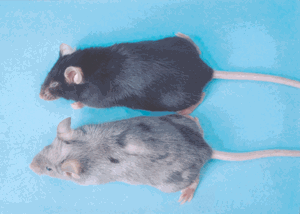Engelhorn ME, Guevara-Patiño JA, Noffz G, Hooper AT, Lou O, Gold JS, Kappel BJ, Houghton AN. Autoimmunity and tumor immunity induced by immune responses to mutations in self. Nature Med. 2006; 2:198-206
Guevara-Patino JA, Engelhorn ME, Turk MJ, Liu C, Duan F, Rizzuto G, Cohen AD, Merghoub T, Wolchok JD, Houghton AN. Optimization of a self antigen for presentation of multiple epitopes in cancer immunity. J Clin Invest. 2006;116(5):1382-90
Cohen AD, Diab A, Perales M-A, Wolchok JD, Rizzuto G, Merghoub T, Huggins D, Liu C, Turk MJ, Restifo NP, Sakaguchi S, Houghton AN. Agonist anti-GITR antibody enhances vaccine-induced CD8+ T-cell responses and tumor immunity. Cancer Res 2006 66(9):4904-12
Ramirez-Montagut T, Chow A, Hirschhorn-Cymerman D, Terwey TH, Kochman AA, Lu S, Miles RC, Sakaguchi S, Houghton AN, van den Brink MR. Glucocorticoid-induced TNF receptor family related gene activation overcomes tolerance/ignorance to melanoma differentiation antigens and enhances antitumor immunity. J Immunol. 2006;176(11):6434-42
Goldberg SM, Bartido SM, Gardner JP, Guevara-Patiño JA, Montgomery SC, Perales MA, Maughan MF, Dempsey J, Donovan GP, Olson WC, Houghton AN, Wolchok JD. Comparison of two cancer vaccines targeting tyrosinase: plasmid DNA and recombinant alphavirus replicon particles. Clin. Cancer Res. 2005; 11(22):8114-21
Segal N, Blachere NE, Guevara-Patino, Gallardo HF, Shiu HYA, Viale A, Antonescu CR, Wolchok JD, Houghton AN. Identification of cancer-testes genes expressed by melanoma and soft tissue sarcoma using bioinformatic recognition for antigen discovery. Cancer Immunity 2005; 5:2-10
Segal NH, Blachere NE, Shiu HYA, Leejee S, Antonescu CR, Lewis JL, Wolchok JD, Houghton AN. Antigens recognized by autologous antibodies of patients with soft tissue sarcoma. Cancer Immunity 2005; 5:4-11
Palomba ML, Roberts WK, Dao T, Manukian G, Guevara-Patino, Wolchok JD, Scheinberg DA, Houghton AN. CD8+ T-cell-dependent immunity following xenogeneic DNA immunization against CD20 in a tumor challenge model of B-cell lymphoma. Clin Cancer Res. 2005; 11:370-379
Gregor PD, Wolchok JD, Turaga V, Latouche J-B, Sadelain M, Bacich D, Heston WDW, Houghton AN, Scher HI. Induction of autoantibodies to syngeneic prostate-specific membrane antigen by xenogeneic vaccination. Int. J. Cancer 2005; 116:415-421
Turk MJ, Guevara-Patino JA, Rizzuto GA, Engelhorn ME, Houghton AN. Concomitant tumor immunity to a poorly immunogenic melanoma is prevented by regulatory T cells. J Exp Med. 2004;200:771-782
Gregor PD, Wolchok JD, Ferrone CR, Buchinshky H, Guevara-Patino JA, Perales MA, Mortazavi F, Bacich D, Heston W, Latouche JB, Sadelain M, Allison JP, Scher HI, Houghton AN. CTLA-4 blockade in combination with xenogeneic DNA vaccines enhances T-cell responses, tumor immunity and autoimmunity to self antigens in animal and cellular model systems. Vaccine. 2004; 22:1700-1708
Gold JS, Guevara-Patiño JA, Ferrone CR, Hawkins WG, Dyall R, Engelhorn ME, Wolchok JD, Lewis JJ, Houghton AN. A single heteroclitic epitope determines cancer immunity following xenogeneic DNA immunization against a tumor differentiation antigen. J Immunol 2003; 170:5188-5194
Srinivasan R, Houghton AN, Wolchok JD. Induction of autoantibodies against tyrosinase-related proteins following DNA vaccination: unexpected reactivity to a protein paralogue. Cancer Immunity 2002; 2:8-17
Trcka J, Moroi Y, Clynes RA, Goldberg SM, Bergtold A, Perales M-A, Ma M, Ferrone CR, Carroll MC, Ravetch JV, Houghton AN. Redundant and alternative roles for activating Fc receptors and complement in an antibody-dependent model of autoimmune vitiligo. Immunity 2002; 16:861-868
Houghton AN, Gold JS, Blachere NE. Immunity against cancer: lessons learned from melanoma. Cur Opin Immunol. 2001;13:134-140.
Hawkins WG, Gold JS, Dyall R, Wolchok J, Hoos A, Bowne WB, Srinivasan R, Houghton AN, Lewis JJ. Immunization with DNA coding for gp 100 results in CD4+ T cell independent antitumor immunity. Surgery 2000:128:273-80
Dhodapkar MV, Young JW,Chapman PB, Cox WI, Fonteneau JF, Amigorena S, Houghton AN, Steinman RMl, Bhardwaj N. Paucity of functional T cell memory to melanoma antigens in healthy donors and melanoma patients. Clin Cancer Res 2000; 6:4831-4838
Castellino F, Boucher PE, Eichelberg K, Mayhew M, Rothman JE, Houghton AN, Germain RN. Receptor-mediated uptake to antigen/heat shock protein complexes results in major histocompatibility complex Class I antigen presentation via two distinct processing pathways. J Exp Med 2000; 191:1957-1964
Moroi Y, Mayhew M, Trcka J, Hoe MH, Takechi Y, Hartl FU, Rothman JE, Houghton AN. Induction of cellular immunity by immunization with novel hybrid peptides complexed to heat shock protein 70. Proc Natl Acad Sci U S A 2000;.97:3485-3490
Bowne WB, Srinivasan R, Wolchok JD, Hawkins WG, Blachere NE, Dyall R, Lewis JJ, Houghton AN. Coupling and uncoupling of tumor immunity and autoimmunity. J Exp Med. 1999;190:1717-1722.
Dyall R, Bowne WB, Weber LW, LeMaoult J, Szabo P, Moroi Y, Piskun G, Lewis JJ, Houghton AN, Nikolic-Zugic J. Heteroclitic immunization induces tumor immunity. J Exp Med. 1998;188:1553-1561.
Wang S, Bartido S, Yang G, Qin, Moroi Y, Panageas KS, Lewis JJ, Houghton AN. A role for a melanosome transport signal in accessing the MHC Class II pres.ation pathway and in eliciting CD4+ T cell response. J Immunol 1999; 163:5820-5826
Weber LW, Bowne WB, Wolchok JD, Srinivasan R, Qin J, Moroi Y, Clynes R, Song P, Lewis JJ, Houghton AN. Tumor immunity and autoimmunity induced by immunization with homologous DNA. J Clin Invest. 1998;102:1258-1264.
Clynes R, Takechi Y, Moroi Y, Houghton A, Ravetch J. Fc receptors are required in passive and active immunity to melanoma. Proc Natl Acad Sci USA. 1998;95:652-656.
Ross, HM, Weber LW, Wang S, Piskun G, Dyall R, Song P, Takechi Y, Nikolic-Zugic J, Houghton AN, Lewis JJ. Priming for T-cell-mediated rejection of established tumors by cutaneous DNA immunization. Clin Cancer Res. 1997;3:2191-2196.
Naftzger C, Takechi Y, Kohda H, Hara I, Vijayasaradhi S, Houghton AN. Immune response to a differentiation antigen induced by altered antigen: a study of tumor rejection and autoimmunity. Proc Nat Acad Sci USA. 1996;93:14809-14814.
Takechi Y, Hara I, Naftzger C, Xu Y, Houghton AN. A melanosomal membrane protein is a cell surface target for melanoma therapy. Clin Cancer Res. 1996;2:1837-1842.
Hara I, Takechi Y, Houghton AN. Implicating a role for immune recognition of self in tumor rejection: passive immunization against the brown locus protein. J Exp Med. 1995;182:1609-1614.
Takahashi T, Chapman PB, Yang SY, Hara I, Vijayasaradhi S, Houghton AN. Reactivity of autologous CD4+ T lymphocytes against human melanoma. Evidence for a shared melanoma antigen presented by HLA-DR15. J Immunol. 1995;154:772-779.
Houghton AN. Cancer antigens: immune recognition of self and altered self. J Exp Med. 1994;180:1-4.
Chapman PB, Gillies SD, Houghton AN, Reilly RM. Mapping effector functions of a monoclonal antibody to GD3 by characterization of a mouse-human chimeric antibody. Cancer Immunol Immunother. 1994;39:198-204.
Wang Z, Cao Y, Albino AP, Zeff RA, Houghton AN, Ferrone S. Lack of HLA class I antigen expression by melanoma cells SK-MEL-33 caused by a reading frameshift in ß2-microglobulin messenger mRNA. J Clin Invest. 1993;91:684-692.
Chapman PB, Houghton AN. Induction of IgG antibodies against GD3 ganglioside in rabbits by an anti-idiotypic monoclonal antibody. J Clin Invest. 1991;88:186-192.
Yuasa H, Scheinberg DA, Houghton AN. Gangliosides of T lymphocytes: evidence for a role in T-cell activation. Tissue Antigens. 1990;35:47-56.
Vijayasaradhi S, Bouchard B, Houghton AN. The melanoma antigen gp75 is the human homologue of the mouse b (brown) locus gene product. J Exp Med. 1990;171:1375-1380.
Chapman PB, Yuasa H, Houghton AN. Homophilic binding of mouse monoclonal antibodies against GD3 gangliosides. J Immunol. 1990;145:891-898.
Welte K, Miller G, Chapman PB, Yuasa H, Natoli E, Kunicka JE, Cordon-Cardo C, Buhrer C, Old LJ, Houghton AN. Stimulation of T lymphocyte proliferation by monoclonal antibodies against GD3 ganglioside. J Immunol. 1987;139:1763-1771.
Houghton AN, Eisinger M, Albino AP, Cairncross JG, Old LJ. Surface antigens of melanocytes and melanomas. Markers for melanocyte differentiation and melanoma subsets. J Exp Med. 1982;156:1755-1766.



